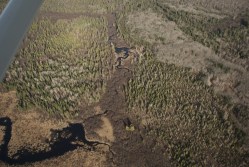By: Ben Cutbank
The words that make up this piece were given to me by the Milwaukee River.
The Milwaukee River runs through the place where I live. Really, it is the place where I live, or at least part of it. This place would not be what it is without the river.
On a warm, sunny day the river will call to me in a bodily way to come into the water, or at least to feel it with my hands or feet. I’m sure this relationship between river and human, river and bird, river and insect, is older and more sacred than I can imagine.
When the river calls to me in this way, I want so badly to get in. I want to spend all of the warm and sunny days heeding this call, and the other days watching from the river’s side, listening and learning.
What breaks my heart is that I will not enter this river and let its waters caress my body, at least not today or any time soon, because its waters are full of poison.
Less than ten years ago, my friends and I would swim in the river on every warm and sunny day. Then, a number of them started experiencing rashes on their skin or felt sick from accidentally letting some of the river water into their mouth. We stopped swimming in the river. The poison dumped or seeped into the river continues to build, and the river continues to be killed, while we essentially stand aside and mourn.
I’m tired of mourning and I’m tired of hearing that this destruction is natural, inevitable, “just the way things are.”
What made clear in my own life that this river was changing for the worse, that it was being killed, was when I no longer wanted to let its waters touch my body. While obviously bad in itself, there’s a larger picture here that must be looked at.
There are living beings—including the river itself—whose lives depend on this river. When the river dies, so to do the fish, bugs, birds, and other animals who drink and eat from the river, who call the river home. Thus, each year that there are more and more pollutants from agricultural run-off in the river, there are less and less songbirds and frogs.
Prior to the arrival of Europeans on this continent, there were human beings who lived here that loved the Milwaukee River. They were indigenous peoples called the Menominee, Potawatomi, and Fox, among other tribes. The lives of these human beings were firmly intertwined with the life of the river. These human beings ate and drank from the river, prayed to the river, and listened to the river’s wisdom.
Those sustainable human cultures were victims—and continue to be victims—of large-scale murder—genocide—at the hands of white settlers. The same people who committed these atrocities against the indigenous humans are now killing the river. Both the river and the human beings who love it—and know how to live sustainability with it—are targets of the dominant culture, industrial civilization. In order to control, exploit, and pollute the river, the humans who depend on it for sustenance must also be displaced or eradicated. We can see how this happened here at home in the case of the Milwaukee River, but we must see further that this has happened everywhere and is the story of civilization.
Currently, every stream in the United States is contaminated with carcinogens. 99% of native prairies have been destroyed. 99% of old growth forests are gone. 90% of the large fish in the oceans are gone. It’s estimated that unless there is a dramatic shift in course, global warming will become irreversible in around 5 years, eventually rendering all life on this planet doomed.
It doesn’t have to be this way. The destruction can be stopped and we must stop it. Clearly, the river, the land, indigenous humans, and so much more life, are the victims of an abusive system. Like all perpetrators, the way to stop them is to aim at the root of the problem and remove or block their ability to abuse. Basically, the goal is to return the circumstances to the way they were before the abuse started, with the victims free and safe. The abuse of civilization has been a campaign of 10,000 years, so obviously there is much to be done to stop it. But, what choice do we have other than to start now and try?
Who or what do you love? Surely you love something or you wouldn’t be here. What would you do to defend your beloved?
I love the Milwaukee River. I want to see this river come back to life, year after year regaining health. I want to see no more poison seeping into the river, no more dams suffocating it, no more destruction of any kind. I want to see all of that destruction reversed and those who would commit abuse stopped and held accountable for their crimes against life.
I love the Milwaukee River and I love life. I will do whatever is necessary to defend the living, before the planet is killed entirely. Will you join me?


